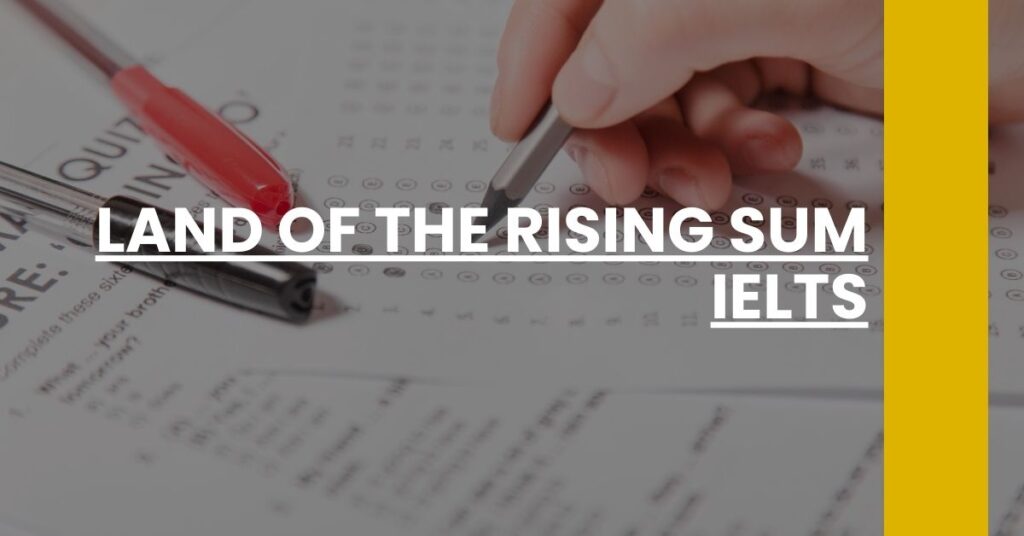In the context of IELTS, “Land of the Rising Sun” is a moniker that signifies Japan. Often encountered in reading passages, understanding its implications can aid candidates in comprehending the cultural nuances embedded in exam questions.
If you’re preparing for IELTS, recognizing the cultural significance of terms like this:
- Bolsters context comprehension in reading and listening sections
- Enhances thematic essays and speaking responses
- Addresses culturally-linked idiomatic phrases adeptly
This piece provides tailored strategies for acing questions on Japan, ensuring the “Land of the Rising Sun IELTS” query leaves you enlightened and exam-ready.
- Understanding the Term “Land of the Rising Sun”
- The “Land of the Rising Sun” and IELTS Reading Passages
- Cultural Context in IELTS: Analyzing Japanese Topics
- Strategies for Tackling IELTS Questions on Cultural Topics
- Common Challenges and Misconceptions about “Land of the Rising Sun”
- Conclusion: Synthesizing Cultural Knowledge in IELTS Preparation
Understanding the Term “Land of the Rising Sun”
When you hear the phrase “Land of the Rising Sun,” your mind might immediately leap to the image of a serene sunrise over Mount Fuji, or the iconic outline of torii gates against a vivid morning sky. This term is deeply woven into the fabric of Japan’s identity. The origin of this phrase is as poetic as it is symbolic, derived from the country’s name in Japanese—Nihon (日本), which translates to “origin of the sun.” This title reflects Japan’s eastern location relative to the Asian continent, highlighting its geographic position where the dawn breaks.
Historical Roots:
- The concept dates back to at least the 7th century and connects to Japan’s powerful symbol—the sun.
- It’s tied to the Shinto religion and the sun goddess Amaterasu, from whom the Japanese imperial lineage is traditionally thought to descend.
- The Rising Sun Flag is another representation of Japan as the “Land of the Rising Sun,” carrying both pride and controversy in its history.
Understanding this term is not just about recognizing a cultural moniker; it adds a layer of depth to your comprehension of Japan’s place in the world—historically, culturally, and geographically. Such insight is invaluable when you’re preparing for exams like the IELTS, where a passage might explore the rich tapestry of Japanese history or the subtleties of its societal norms.
The “Land of the Rising Sun” and IELTS Reading Passages
As an IELTS candidate, you’re likely to encounter reading passages that delve into various aspects of global cultures, including Japan. These passages aim to assess your reading comprehension through diverse topics, one of which could very well be an excerpt discussing the significance of the “Land of the Rising Sun” in Japanese culture.
Themes You Might Encounter:
- The influence of Shinto beliefs and their impact on Japanese society.
- The historical context of Japan’s relations with its neighbors.
- The artistic and literary references to the sun in Japanese culture.
Imagine reading a passage about the annual observance of the emperor’s birthday or the traditions of the Gion Matsuri festival, framed by the knowledge of Japan’s identity as the “Land of the Rising Sun.” This context provides an enriching backdrop that enhances your understanding, enabling you to navigate the questions with greater ease.
You may find passages infused with unique Japanese values like harmony (和), or references to the timeless art forms that fill Japan’s history—the delicate dance of the geisha or the disciplined strikes of kendo practitioners. Your appreciation for these cultural nuances will be reflected in your ability to grasp main ideas and implicit meaning, both skills that the IELTS exam demands.
Cultural Context in IELTS: Analyzing Japanese Topics
Engaging with IELTS questions that have a cultural slant requires a broad understanding and, yes, a certain finesse. This is especially true when considering Japanese-themed topics. Whether it’s a conversation in the listening module or a written essay about traditional customs, an awareness of the cultural context elevates your responses from good to great.
Why Does Cultural Context Matter?
- It enables you to interpret nuanced language and concepts that directly influence your IELTS scores.
- Cultural awareness fosters a connection with the material, making it easier to remember facts and details.
- It provides perspective, allowing you to make educated guesses when faced with unfamiliar terms or ideas.
By integrating knowledge about Japan, such as its reverence for nature and meticulous approach to craftsmanship, you not only boost your IELTS performance but also develop a rich, well-rounded understanding of a culture that cherishes its heritage as the “Land of the Rising Sun.” After all, as IELTS hackers suggest, understanding the culture behind a language is key to mastering it, a benefit that extends far beyond acing a test, to include engaging in meaningful global conversations.
In this context, familiarizing yourself with terms like “Land of the Rising Sun” is a critical puzzle piece that connects you to a broader cultural dialogue—one that you’re likely to encounter on your IELTS journey. Whether you’re dissecting a complex text or articulating your viewpoint in speaking tasks, the cultural richness provides a compass that guides your interpretations and responses with greater clarity and confidence.
Strategies for Tackling IELTS Questions on Cultural Topics
When you encounter questions about the “Land of the Rising Sun” on the IELTS, it’s essential to apply a tactical approach. Cultural topics can be intricate, so let’s streamline your strategy for these particular questions.
Preparation is Key: First, make sure you’re equipped with foundational knowledge about Japan. This means understanding key historical events, cultural practices, and societal norms. A good grasp on these areas will ensure your responses are rooted in context and resonate with depth.
Active Reading and Listening:
- Scan for keywords related to Japan, such as samurai, kimonos, or Sumo wrestling.
- Correlate what you know about Japanese culture to the material. For example, if a passage mentions hanami, recall how this cherry blossom viewing embodies the transient beauty of life, a concept known as mono no aware.
Context Clues: Utilize context clues in passages to infer meanings. For instance, if a sentence reads, “The tradition, symbolic of Japan’s halcyon days, is still cherished,” the surrounding sentences might allude to the peaceful Edo Period often represented in Japanese art and literature.
Cultural Nuances: Be attentive to cultural nuances, particularly when they pertain to respectful or honorific language. Understanding the subtleties can help you interpret the sentiment behind statements, a skill useful for those complex IELTS tasks.
Approach these sections not just as tasks to be completed but as opportunities to demonstrate your cultural literacy and sensitivity. This mindset shift will naturally improve the quality of your responses, underscoring your well-rounded preparation.
Common Challenges and Misconceptions about “Land of the Rising Sun”
The phrase “Land of the Rising Sun” is evocative and symbolic, yet it’s surrounded by misconceptions that can skew your interpretation and answers on IELTS. Some believe it implies Japan is where the sun rises first in the world, whereas it actually reflects the country’s location to the east of China. This is a vital distinction that echoes Japan’s historical perspective and not a geographical fact.
Moreover, while the term rings with romanticism and national pride, don’t forget that it’s also tangled with historical complexities, including periods of war and expansion. Such layers of meaning can influence text and speech topics within your IELTS materials. By clarifying these common misconceptions, you help ensure that your comprehension and subsequent answers are grounded in accuracy and insight.
Remember that each cultural reference in IELTS is twofold: it’s a possible test question and a glimpse into the worldview of others. By embracing the beauty and intricacy of Japan’s label as the “Land of the Rising Sun,” you do more than score well on a test; you gain perspective—a valuable asset in a globally interconnected world.
In transitioning from comprehension to expression, let’s summarize how you can synthesize your cultural knowledge for a robust IELTS preparation.
Conclusion: Synthesizing Cultural Knowledge in IELTS Preparation
To conclude, your journey toward the IELTS is enriched by understanding the cultural context tied to phrases like “Land of the Rising Sun.” This knowledge does more than just prepare you for potential Japan-related questions; it sews a tapestry of cultural insight into the fabric of your language proficiency.
As you step forward, remember that each strategy serves a common goal: to empower your voice and narrative within the modules of the IELTS exam. Whether you’re drawing from cultural topics or any other subject matter, the depth of your preparation is what sets you apart in the “land of the rising sum IELTS” challenge.
Hold onto the knowledge of phrases such as “Land of the Rising Sun” as both a tool and a testament to your dedication. It’s the harmonious blend of cultural understanding and strategic test-taking that will light your path to IELTS success, allowing you to rise and shine.
Land of the Rising Sun IELTS insights—unlock Japan’s cultural nuances to excel in reading and comprehension sections effectively.

